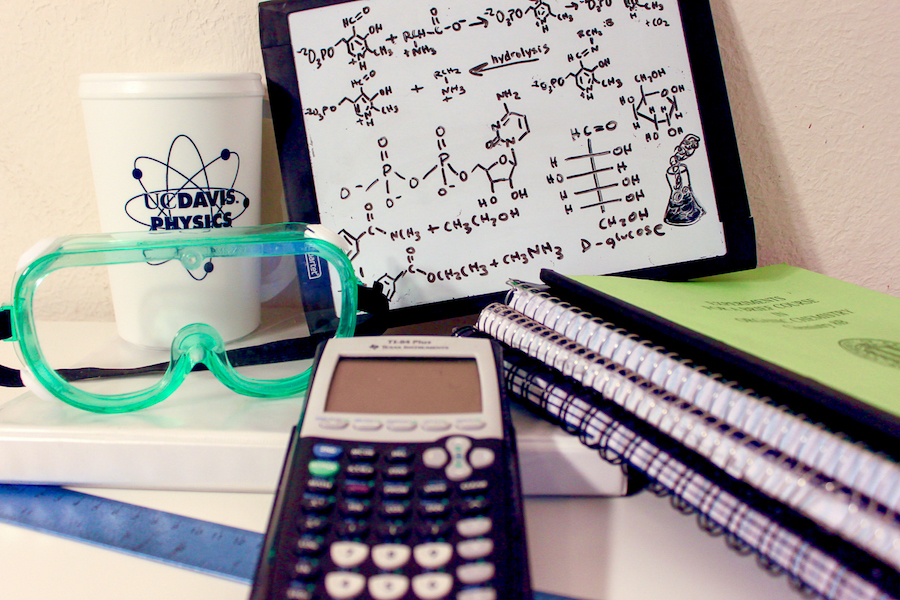
How to successfully navigate a STEM undergraduate career; advice from STEM major advisors
Freshman year can be notoriously overwhelming, but, luckily, for first-years in need of advice, there are plenty of resources available. Emma Martinez, Lori Bergum, Kate Creveling and Natasha Coulter, four of the many science, technology, engineering and math (STEM) major advisors at UC Davis, sat down with The Aggie to offer their best advice to freshman and others in the undergraduate STEM major realm at UC Davis.
Emma Martinez, staff advisor for animal science majors, urges freshman and transfer students to take their first quarter slow by limiting themselves to two science courses and 12 to 13 units.
“It’s really great for freshman at the end of the quarter to go away being like ‘Yeah I did it! I got straight A’s, I feel really good about it,’ rather that walking away being like ‘I’m on academic probation,’” Martinez said. “It’s really hard to recover emotionally from the latter. When you end on a good note, you want to come back and continue it.”
In addition to starting off slowly, Martinez advises freshman to take advantage of the resources that UC Davis has as both a research institution and as home to the top-ranked veterinary school in the world.
“[The Veterinary school] offers internships […] They allow students to intern in specific areas at the veterinary hospital. They can do things like cardiology, radiology, small animal surgery [and] large animal surgery,” Martinez said.
Martinez also recommended Animal Science 49: Animal Management Practices, a two unit Pass/No Pass course that allows students to work at different animal facilities on campus.
“A lot of times that can be used as a segue into a more hands-off, management-style internship,” Martinez said.
That internship opportunity could be key for a student when he or she is looking for a job later on, but exactly how important it is depends on what career the student wants.
“If someone is considering veterinary school, the number one thing we tell them to focus on is their GPA. Veterinary school [acceptances] average around a 3.6 GPA, which is roughly an A- to a B+,” Martinez said. “If they’re thinking graduate school […] we would tell them focus on the grades but be sure to include research. But for a student who is looking to enter into the career world, we tell them to really explore […] go do internships.”
Along with animal science, biology also comprises a large part of the STEM student body. Although most students enter the major hoping to go into a medical profession, Lori Bergum, academic advisor for biochemistry and biology, urges them to follow non-major related passions while keeping up with schoolwork, partially for the sake of their careers.
“There’s kind of a misconception about ‘I’m studying science and I can just do science,’” Bergum said. “A lot of employers, specifically admissions for master’s programs and healthcare professional programs, are looking for a well-rounded student — [one] getting experience, developing relationships in labs or internships […] even study abroad or doing volunteer work.”
The life sciences make up only a small part of all STEM majors. Undergraduate program advisor for computer science Natasha Coulter urges students to get experience outside of the classroom, especially because computer science majors can add to their resumes by doing projects on their own.
“I think the largest thing that you can do to show your tenacity and determination for computer science is to show your interest in it in building whatever you’re interested in,” Coulter said. “If you want to do apps, just build an app.”
Theoretically, because a student could work in solitude, the computer sciences can be misconstrued by some as a “lonely” major. Coulter maintains that UC Davis fosters a special community for the people in computer sciences.
“There’s a really strong computer science club that handles tutoring for lower division courses as well as organizing the hackathon and [other] fun gaming events for everyone to relax [at],” Coulter said. “Because it is a high-stress major and it takes a lot of time to do this degree, […] being able to balance that and enjoy your college time is really important, and the students in this major make that a priority.”
Computer science is just one of many aspects of engineering. Kate Creveling, academic advisor for electrical engineering and computer engineering majors, believes that UC Davis offers engineering majors unique opportunities, especially when it comes to getting a job after graduation.
“Companies want our students. We have, at the College of Engineering, an entire corporate donor relations side,” Creveling said. “People in [the] industry donate to our college because they want first dibs on our students because they’re proven to be competent, successful contributors in the workforce. We have, as a college, great relationships with corporate and industry companies that have hired Davis students who want more of them.”
Creveling also urges students not to panic if they feel academically behind.
“There’s so much available to [engineering students] on campus, whether it’s through tutoring or programs, or clubs or research or career fairs. Everything they need to be successful is here,” Creveling said. “It’s really about them having the initiative to get out and get connected to it, and if they’re having trouble navigating or finding where to start, they should always see their academic advisor.”
Written by: Meral Basit — science@theaggie.org









